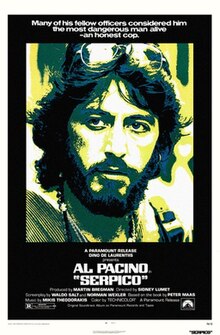Serpico
| Serpico | |
|---|---|

Theatrical release poster
|
|
| Directed by | Sidney Lumet |
| Produced by | Martin Bregman |
| Screenplay by | |
| Based on |
Serpico by Peter Maas |
| Starring | Al Pacino |
| Music by | Mikis Theodorakis |
| Cinematography | Arthur J. Ornitz |
| Edited by | Dede Allen |
|
Production
companies |
|
| Distributed by | Paramount Pictures |
|
Release date
|
|
|
Running time
|
130 minutes |
| Country | United States |
| Language | English |
| Budget | $2.5–3 million |
| Box office | $29.8 million (North America) |
Serpico is a 1973 American neo-noircrime drama film directed by Sidney Lumet and starring Al Pacino. Waldo Salt and Norman Wexler wrote the screenplay, adapting Peter Maas's biography of NYPD officer Frank Serpico, who went undercover to expose corruption in the police force. Both Maas's book and the film cover 12 years, 1960 to 1972.
The film and principals were nominated for numerous awards, earning recognition for its score, direction, screenplay, and Pacino's performance. The film was also a commercial success.
Working as a uniformed patrolman, Frank Serpico excels at every assignment. He moves on to plainclothes assignments, where he slowly discovers a hidden world of corruption and graft among his own colleagues. After witnessing cops commit violence, take payoffs, and other forms of police corruption, Serpico decides to expose what he has seen, but is harassed and threatened by his peers. His struggle leads to infighting within the police force, problems in his personal relationships, and his life being threatened. Finally, after being shot in the face during a drug bust on February 3, 1971, he testifies before the Knapp Commission, a government inquiry into NYPD police corruption between 1970 and 1972. After receiving a New York City Police Department Medal of Honor and a disability pension, Serpico resigns from the force and moves to Switzerland.
Prior to any work on the film, producer Martin Bregman had lunch with Peter Maas to discuss a film adaptation of his biography of Frank Serpico.Waldo Salt, a screenwriter, began to write the script which director Sidney Lumet deemed to be too long. Another screenwriter, Norman Wexler, did the structural work followed by play lines.
...
Wikipedia
